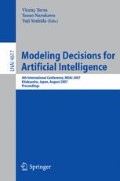Abstract
We present a multicriteria fuzzy system using gradual rules and fuzzy arithmetic. We first present a multicriteria problem and its solution for the case of precise information. Then we extend the model to treat pieces of information that may involve imprecision/vagueness. We show that the use of residuated implication operators, employed by gradual rules, coupled with similarity relations offer a better treatment of the problem than a Mamdani-like approach.
Access this chapter
Tax calculation will be finalised at checkout
Purchases are for personal use only
Preview
Unable to display preview. Download preview PDF.
References
Chen, S.-M.: Fuzzy group decision making for evaluating the rate of aggregative risk in software development. Fuzzy Sets and Systems 118, 75–88 (2001)
Cheng, C.-H., Chang, J.-R.: MCDM aggregation model using situational ME-OWA and ME-OWGA operators. Int. J. of Unc., Fuzz. and Knowledge Based Systems 14(4), 421–443 (2006)
Drummond, I., Godo, L., Sandri, S.: Learning fuzzy systems with similarity relations. In: De Baets, B., Kaynak, O., Bilgiç, T. (eds.) IFSA 2003. LNCS, vol. 2715, pp. 516–523. Springer, Heidelberg (2003)
Dubois, D., Prade, H.: Possibility theory: an approach to computerized processing of uncertainty. Plenum Press, New York (1988)
Dubois, D., Prade, H.: What are fuzzy rules and how to use them. Fuzzy Sets and Systems 84, 169–185 (1996)
Dubois, D., Prade, H., Ughetto, L.: Coherence of Fuzzy Knowledge Bases. In: Proc. Fuzz-IEEE 1996, New Orleans (USA), pp. 1858–1864 (1996)
Dubois, D., Prade, H., Ughetto, L.: Checking the coherence and redundancy of fuzzy knowledge bases. IEEE Trans. on Fuzzy Systems 5(3), 398–417 (1997)
Godo, L., Sandri, S.: A similarity based approach to deal with inconsistency in systems of fuzzy gradual rules. In: Proc. IPMU 2002, Annecy (Fr), pp. 1655–1662 (2002)
Godo, L., Sandri, S.: Dealing with covering problems in fuzzy rule systems by similarity-based extrapolation. In: Proc. FuzzIEEE 2002, Honolulu (USA) (2002)
Greco, S., Matarazzo, B., Slowinski, R.: Dominance-Based Rough Set Approach to Decision Involving Multiple Decision Makers. In: Greco, S., Hata, Y., Hirano, S., Inuiguchi, M., Miyamoto, S., Nguyen, H.S., Słowiński, R. (eds.) RSCTC 2006. LNCS (LNAI), vol. 4259, pp. 306–317. Springer, Heidelberg (2006)
Martinez, L., Liu, J., Yang, J.-B.: A fuzzy model for design evaluation based on multiple criteria analysis in engineering systems. Int. J. of Unc., Fuzz. and Knowledge Based Systems 14(3), 317–336 (2006)
Sibertin-Blanc, C., Amblard, F., Mailliard, M.: A coordination framework based on the Sociology of Organized Action. In: Boissier, O., Padget, J., Dignum, V., Lindemann, G., Matson, E., Ossowski, S., Sichman, J.S., Vázquez-Salceda, J. (eds.) Coordination, Organizations, Institutions, and Norms in Multi-Agent Systems. LNCS (LNAI), vol. 3913, pp. 3–17. Springer, Heidelberg (2006)
Smolíková, R., Wachowiak, M.P.: Aggregation operators for selection problems. Fuzzy Sets and Systems 131, 23–24 (2002)
Yager, R.R.: On ordered weighted averaging aggregation operators in multi-criteria decision making. IEEE Trans. on Systems, Man and Cybernetics 18, 183–190 (1988)
Yager, R.R.: An approach to ordinal decision making. Int. J. of Approx. Reasoning 12, 237–261 (1995)
Zadeh, L.A.: Fuzzy sets. Inform. and Control 8, 338–353 (1965)
Author information
Authors and Affiliations
Editor information
Rights and permissions
Copyright information
© 2007 Springer-Verlag Berlin Heidelberg
About this paper
Cite this paper
Sandri, S., Sibertin-Blanc, C., Torra, V. (2007). A Multicriteria Fuzzy System Using Residuated Implication Operators and Fuzzy Arithmetic. In: Torra, V., Narukawa, Y., Yoshida, Y. (eds) Modeling Decisions for Artificial Intelligence. MDAI 2007. Lecture Notes in Computer Science(), vol 4617. Springer, Berlin, Heidelberg. https://doi.org/10.1007/978-3-540-73729-2_6
Download citation
DOI: https://doi.org/10.1007/978-3-540-73729-2_6
Publisher Name: Springer, Berlin, Heidelberg
Print ISBN: 978-3-540-73728-5
Online ISBN: 978-3-540-73729-2
eBook Packages: Computer ScienceComputer Science (R0)

